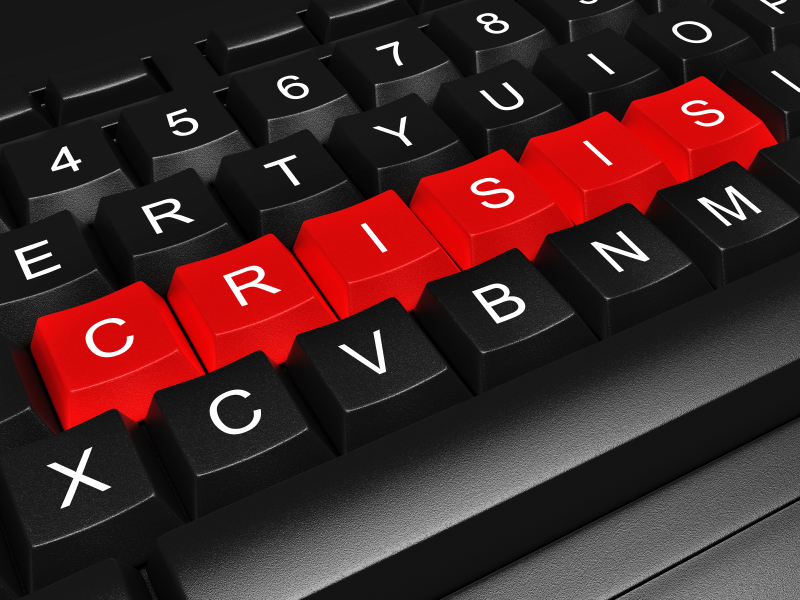
After editing the “Crisis of the Week” column for The Wall Street Journal for nearly five years, it is safe to say Ben DiPietro has seen it all when it comes to crisis management. When he left the Journal in August, we asked him about the landscape of online and public-opinion crisis cycles, and what you need to know if you find yourself face-to-face with a reputation-based crisis to manage.
Genesis of the Crisis of the Week Column
 Working with Nick Elliott, his editor at the WSJ, DiPietro launched the inaugural “Crisis of the Week” column on Sept. 20, 2014, following the emergence of video footage depicting NFL running back Ray Rice violently abusing his wife–and the ensuing public opinion backlash. There is a great deal of nuance in the way affiliated professional organizations handle such crises and they saw the column as an opportunity to pull apart the narrative threads behind media messaging and crisis management.
Working with Nick Elliott, his editor at the WSJ, DiPietro launched the inaugural “Crisis of the Week” column on Sept. 20, 2014, following the emergence of video footage depicting NFL running back Ray Rice violently abusing his wife–and the ensuing public opinion backlash. There is a great deal of nuance in the way affiliated professional organizations handle such crises and they saw the column as an opportunity to pull apart the narrative threads behind media messaging and crisis management.
During his time at WSJ, DiPietro and his stable of prominent crisis-management experts pulled the covers back more than 100 crises, all corporate-focused in nature, offering insights into what was being done well–and not so well–in the crisis response, messaging and delivery. The column ended with an Aug. 7, 2018 column on the Urban Meyer crisis at Ohio State University. (As one of Ben’s Crisis commentators, I had the opportunity to weigh in on that one.)
The column profiled a wide range of crisis scenarios–sexual misconduct, corporate malfeasance, product-related deaths, stupid comments–that resulted in everything from major reputational disasters to more favorable outcomes. “Location, cultural mores and political climate all are factors in how big a crisis becomes,” said DiPietro.
Results Range from Disastrous to Mundane
There is great variety in the ways organizations handle emerging crises, with results that range from disastrous to mundane. In some cases, DiPietro said companies gamble they won’t suffer much negative fallout and so they don’t even bother to manage a crisis.
“If you have a garden-variety crisis, companies often rely on the intuition that it will blow over,” or that more consequential news will drive their crisis out of the media spotlight, he said. “Their best bet might be not to engage.”
On the other hand, being proactive can be valuable in re-establishing trust in a company or brand. By clearly outlining the situation in question and what they are doing to improve, companies can double-down on following their stated ethical standards and brand values.
A code of conduct can be important in such instances, as it sets expectations for how an organization wants to be thought of, and sends a strong signal for how it wants employees and partners to act. DiPietro said a code is “only as good as the organization’s overall culture, and how much senior and middle management live the values spelled out in it. Employees and stakeholders will see through empty words, and a leader who doesn’t lead by example won’t have much of an organization to lead.”
Additionally, being the first to draw attention to an issue can afford a company narrative control. When it comes to a complex or significant crisis, “get the bad news out first — companies that don’t do that get sucked into the vortex,” he advises.
How to tell garden-variety from five-alarm fire?
How to tell garden-variety from five-alarm fire? Check first for how much attention is the crisis receiving on major media and in the social media octagon; look for how other groups are using your crisis to advance their cause, DiPietro said. Are federal law enforcement and regulators involved? That could spell trouble, react accordingly.
Other questions to ask:
- Did the company/individual respond appropriately?
- Is there a perceived systemic issue or an individual case that needs to be addressed?
- How much trust do people have in a company/individual and its reputation?
- How much trust is there within the organization?
Whatever a company does, it’s important it doesn’t bluff to obscure wrongdoing or poor behavior, as DiPietro warns “the cover-up is worse than the crime,” and can inflict permanent damage on public and private trust.
When corporate crises arise, they don’t always have to be considered as negative moments for a company; they can prompt growth and change that improves internal culture and the bottom line. In taking the initiative to correct for any issues highlighted by crises, DiPietro indicates there is an opportunity for good publicity: “Bad news travels fast now. But on social media, good news does, too.”
Follow Ben @BenDiPietro1


